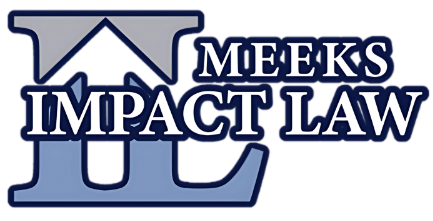Personal Injury Settlements vs. Going to Court: What Georgia Injury Victims Should Consider
Suffering a personal injury can be overwhelming, especially when you’re faced with complex decisions about how to pursue justice. One of the important choices you’ll encounter is whether to settle your case or take it to court.
Understanding the difference between these options can empower you to make the best decision for your future. Below, we break down the pros and cons of each path, with insights based on Georgia law and our experience helping clients at Meeks Impact Law.
What It Means to Settle a Personal Injury Case
A settlement occurs when both parties, the injured person and the at-fault party (usually through their insurance company), reach an agreement outside of court. In Georgia, many personal injury cases are resolved this way.
Advantages of Settling
- Faster resolution:
Settlements allow you to receive compensation more quickly.
- Lower legal costs:
By settling outside of court, you avoid many of the layered costs that naturally come with taking a case to trial.
- Privacy:
Settlements are generally private agreements between the parties, although there may be exceptions when court approval or filing is required. Court verdicts, on the other hand, are generally part of the public record and accessible under the Open Records Act (O.C.G.A. § 50-18-70), unless sealed by a court or specifically exempted by law.
- Reduced stress:
A settlement avoids the additional uncertainty and emotional toll that comes with a court battle.
Potential Drawbacks
- Possibly lower compensation:
Without skilled legal guidance, settlement offers may not fully reflect the long-term costs of serious injuries.
- Finality:
Once you accept a settlement, it is generally considered final, and you cannot pursue additional claims for the same accident.
Going to Court: What You Need to Know
If a fair settlement cannot be reached, your case may go to trial. This is where the right legal team makes all the difference, as presenting evidence and arguments before a judge or jury requires thorough preparation and skilled advocacy.
Advantages of Going to Court
- Potential for higher compensation:
While outcomes are never guaranteed, juries have the ability to award substantial compensation in cases of serious injury and proven negligence.
- Accountability:
A successful verdict not only awards damages but also creates a public record of the negligent party’s responsibility.
Potential Drawbacks
- Time and stress:
Between depositions, discovery, and scheduling with the courts, trials may extend over many months or even years, requiring patience and perseverance.
- Increased costs:
Courtroom litigation comes with additional costs for expert witnesses, court filings, and other trial expenses. In personal injury cases, these are usually advanced by your legal team and are repaid out of the money recovered for you.
- Uncertainty:
Jury trials carry inherent risk, as outcomes can be unpredictable. Strong evidence and skilled representation can improve your chances, but there is never a guarantee of success.
Key Factors to Consider Before Deciding
Choosing between settlement and trial is not one-size-fits-all. Depending on your circumstances, one path may not be advisable, at least at a certain stage of the case. A skilled attorney can help you weigh the risks and benefits, charting the best course toward success. Key factors to consider include:
- Severity and long-term impact of your injuries
- Strength of the evidence supporting your case
- Your tolerance for time, costs, and uncertainty
- Willingness of the insurance company to negotiate in good faith
Important: Important: In Georgia, most personal injury claims must be filed within two years of the date the claim accrues, which is usually the date of the injury. This deadline is set by O.C.G.A. § 9-3-33. However, other types of claims have different time limits. Don't wait to reach out.
How Georgia’s 2025 Tort Reform Changes May Affect Your Case
Earlier in 2025, Georgia passed Senate Bill 68, a sweeping tort reform law that introduces both substantive and procedural changes, potentially creating new challenges for injury victims:
Guidelines on arguing non-economic damages: The law restricts how plaintiffs and their attorneys can present pain and suffering claims. Any suggested values must be reasonably related to the evidence, effectively curbing anchoring tactics.
Tougher standards in negligent security cases: Victims now face a higher burden of proof, such as showing prior similar incidents or a foreseeable threat, making it more difficult to hold property owners liable.
Procedural tools that favor defendants: The law allows motions to dismiss to stay discovery, enables bifurcation of trials into liability and damages phases, and places new restrictions on voluntary dismissals, making it harder for plaintiffs to refile cases.
For injury victims, these changes and more mean the road to justice is now more complex, requiring precise legal strategy.
Learn more:
What Georgia’s 2025 Tort Reform Really Means for Injury Victims
How Insurance Companies Approach Settlements
Insurance companies are businesses, and their goal is to pay out as little as possible. Common tactics they use include:
- Delaying responses to pressure victims financially.
- Disputing medical treatment or the extent of injuries.
- Offering 'lowball' settlements quickly to close the case.
Having an experienced attorney helps level the playing field.
Real Client Story
At Meeks Impact Law, we have seen how critical it is to choose the right strategy. One of our clients faced mounting medical bills after a serious accident caused by a negligent driver. The insurance company initially offered a settlement that barely covered medical expenses. We advised pursuing litigation and, through thorough case preparation and expert testimony, secured a significantly higher award. This gave our client real relief and a stronger path to recovery.
Injured in Georgia? Let’s Talk About Your Options
You don’t have to face the insurance companies or court system alone. At Meeks Impact Law, we’ll take the time to understand your story, explain your options, and fight for the outcome you deserve. Contact Meeks Impact Law today at 678-341-5117
for a free, confidential consultation.
